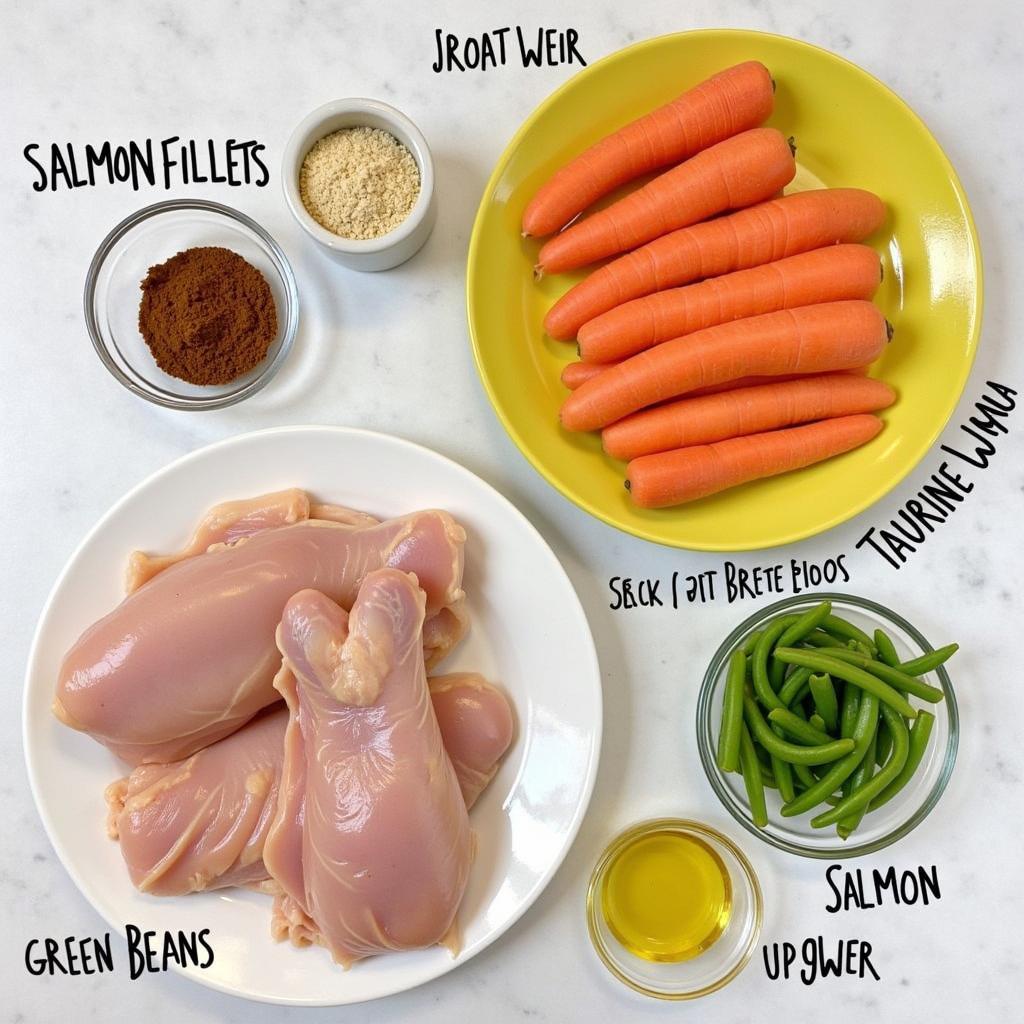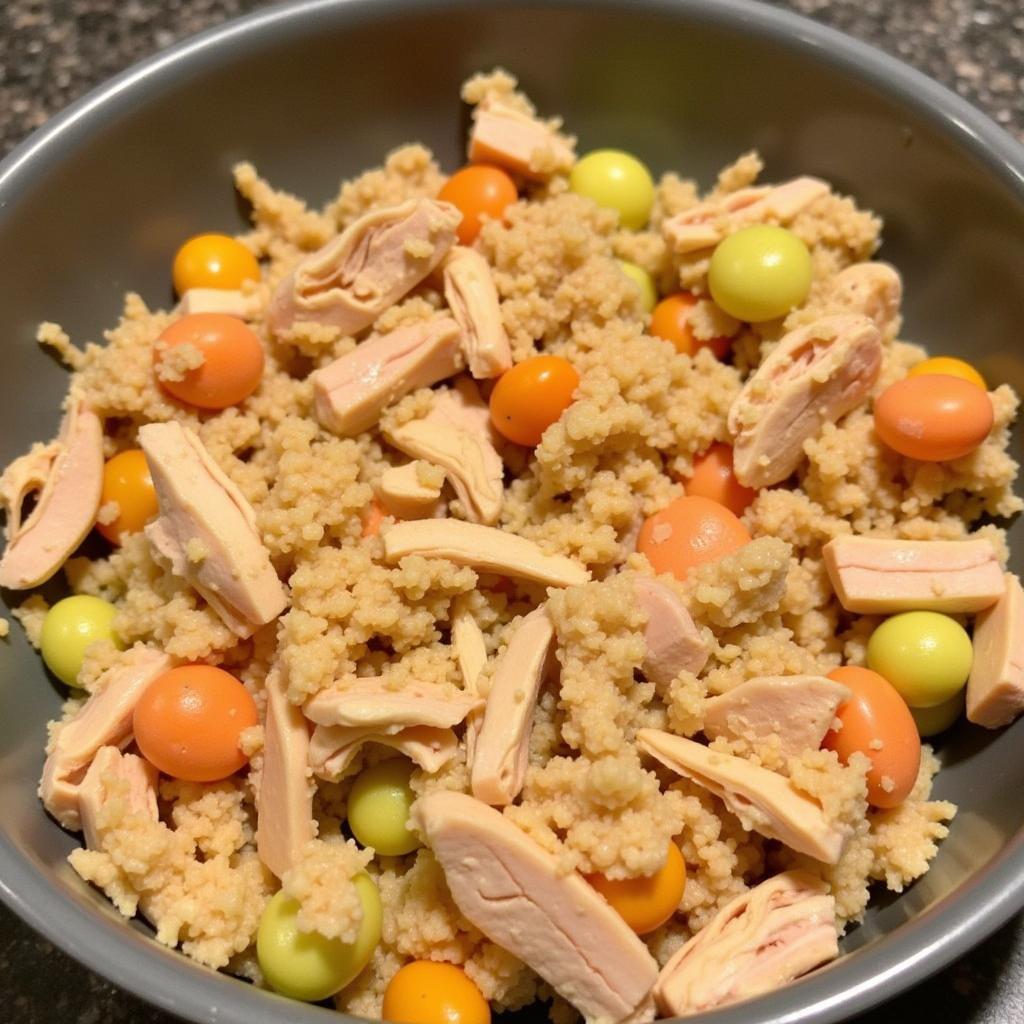Creating Homemade Maine Coon Cat Food can be a rewarding experience, ensuring your gentle giant receives the optimal nutrition they need. This comprehensive guide dives into the specifics of crafting delicious and nutritious meals tailored to the unique needs of your Maine Coon.
Understanding the Nutritional Needs of a Maine Coon
Maine Coons, with their large size and active nature, require a diet rich in high-quality protein, healthy fats, and essential vitamins and minerals. Unlike smaller breeds, their nutritional requirements are slightly different, calling for a carefully balanced diet to support their growth and overall health.
Commercial cat foods may not always meet these specific needs, often containing fillers and additives that can be detrimental to your Maine Coon’s long-term health. This is where gentle giant cat food comes into play. By making your cat’s food at home, you control the ingredients, ensuring they receive the best possible nourishment.
Key Ingredients for Homemade Maine Coon Cat Food
What constitutes a healthy homemade Maine Coon cat food recipe? Prioritizing high-quality protein sources is essential. Chicken, turkey, and fish like salmon are excellent choices. Remember, protein should make up the bulk of your cat’s diet.
Next, incorporate healthy fats. These are crucial for maintaining a healthy coat, skin, and overall well-being. Salmon oil and other fish oils are excellent sources of omega-3 fatty acids.
Finally, don’t forget essential vitamins and minerals. While supplements can be helpful, incorporating nutrient-rich vegetables like carrots and green beans can provide a natural boost.
Creating a Balanced Meal Plan for Your Maine Coon
A balanced meal plan requires careful consideration of both the ingredients and their proportions. Aim for a diet consisting primarily of protein (around 50-60%), followed by healthy fats (around 20-30%), and a smaller percentage of carbohydrates (less than 10%).  A variety of ingredients for making homemade Maine Coon cat food
A variety of ingredients for making homemade Maine Coon cat food
Why is Protein So Important?
Protein is the cornerstone of a healthy diet for a Maine Coon, fueling their growth and maintaining their muscular physique.
What About Fats?
Don’t be afraid of fats! Healthy fats are essential for your Maine Coon’s coat, skin, and overall health, providing them with the energy they need to thrive.
The Role of Vitamins and Minerals
Vitamins and minerals play a crucial role in supporting various bodily functions, ensuring your Maine Coon stays healthy and active.
Dr. Emily Carter, a renowned feline nutritionist, emphasizes the importance of a balanced diet: “A well-balanced homemade diet is key to a Maine Coon’s longevity and vitality. It allows owners to cater to their cat’s specific needs, preventing potential health issues down the line.”
Simple Homemade Maine Coon Cat Food Recipe
Here’s a simple and nutritious recipe to get you started:
- Protein Source: 1 cup cooked chicken or turkey, shredded.
- Healthy Fat: 1 tablespoon salmon oil.
- Vegetables: ½ cup cooked and mashed carrots and green beans.
- Supplements (optional): Taurine and other essential vitamins as recommended by your veterinarian.
Mix all ingredients thoroughly and serve.
 A bowl of freshly prepared homemade Maine Coon cat food
A bowl of freshly prepared homemade Maine Coon cat food
Conclusion
Preparing homemade Maine Coon cat food empowers you to prioritize your cat’s health and well-being. By carefully selecting ingredients and following a balanced recipe, you can ensure your gentle giant thrives. Remember to consult with your veterinarian for personalized advice and to adjust the recipe based on your cat’s specific needs. This gentle giant cat food will help your Maine Coon live a long, healthy, and happy life.
FAQ
- How often should I feed my Maine Coon homemade food? Twice daily is usually sufficient for adult Maine Coons.
- Can kittens eat homemade food? Yes, but the recipe should be adjusted to meet their growing needs. Consult your vet for kitten-specific recipes.
- How do I store homemade cat food? Store it in airtight containers in the refrigerator for up to 3 days.
- Is homemade food more expensive than commercial food? It can be, depending on the ingredients you choose.
- What are the signs of a nutritional deficiency in Maine Coons? Dull coat, weight loss, and lethargy can be signs of a deficiency.
- Can I transition my Maine Coon from commercial food to homemade food gradually? Yes, a gradual transition is recommended to avoid digestive upset.
- What if my Maine Coon refuses to eat homemade food? Try mixing a small amount of homemade food with their current food and gradually increase the proportion.
When you need support, please contact Phone Number: 02437655121, Email: minacones@gmail.com Or visit: 3PGH+8R9, ĐT70A, thôn Trung, Bắc Từ Liêm, Hà Nội, Việt Nam. We have a 24/7 customer service team.